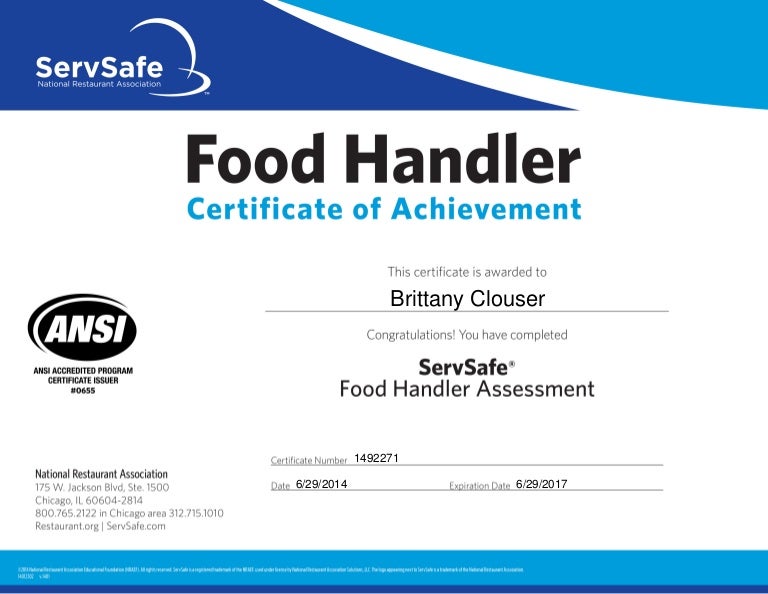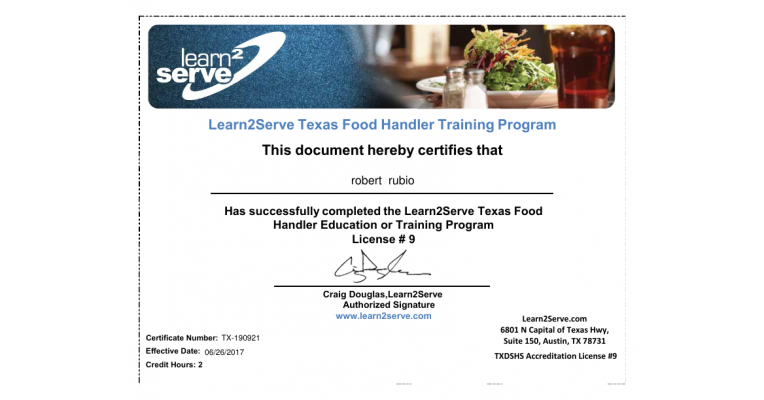Exactly How ServSafe Food Handlers Certificates Assist Protect Against Foodborne Illnesses
Exactly How ServSafe Food Handlers Certificates Assist Protect Against Foodborne Illnesses
Blog Article
Get Qualified: Master Food Security With Food Handler Certification
The importance of obtaining a Food Trainer Qualification can not be overemphasized in today's food service landscape. As the market faces enhancing scrutiny pertaining to food safety and security criteria, recognizing the accreditation procedure and its effects becomes crucial.

Importance of Food Safety And Security Accreditation
Food security accreditation is critical for making sure that food handlers are outfitted with the knowledge and skills required to preserve high standards of hygiene and security in food preparation and solution. This qualification not only improves the competency of people working in the food market yet likewise promotes a culture of safety that profits both workers and consumers.
By acquiring food safety certification, food trainers come to be knowledgeable about important practices such as appropriate food storage, cross-contamination avoidance, and personal health requirements. ServSafe Food Handler Certification. This understanding considerably reduces the risk of foodborne health problems, which can have extreme health implications and impact public trust fund in food facilities. Qualified food trainers are better prepared to conform with nationwide and regional policies, thus minimizing the risk of lawful responsibilities and charges for food companies.
Additionally, having licensed personnel can boost a facility's online reputation, as consumers significantly prioritize safety in their dining experiences. Inevitably, food safety and security certification is not simply a regulatory need; it is a crucial investment in the general high quality and reliability of food solution operations, promoting trust fund and guaranteeing that safety and security stays a leading priority in the sector.

Introduction of Qualification Process
Safeguarding food safety certification entails a structured procedure made to outfit food trainers with the needed understanding and skills. This procedure usually begins with picking an approved training program, which can be provided in different styles such as in-person classes, on-line programs, or hybrid alternatives. Individuals should choose a program that fulfills local regulative demands and lines up with their learning choices.
As soon as signed up, prospects participate in thorough training that covers essential food security ideas and practices - ServSafe Food Handler. This training commonly includes interactive modules, real-world scenarios, and assessments to reinforce knowing. After finishing the coursework, participants must pass a certification examination that evaluates their understanding of food security concepts
Upon efficiently removing the examination, people get their food trainer certification, which is normally legitimate for a details period, usually ranging from one to three years. It is essential for licensed food trainers to stay updated with any adjustments in food security guidelines and methods, necessitating routine renewal or continuing education. This qualification process is crucial for making certain that food handlers are knowledgeable about risk-free food dealing with methods, thus lowering the threat of foodborne diseases and advertising public wellness.
Secret Topics Covered in Training
A detailed food handler training program commonly covers numerous key topics necessary for keeping food security and stopping foodborne illnesses. Comprehending the concepts of food safety and security is foundational, consisting of the importance of proper health practices for food trainers. This includes handwashing methods, proper use gloves, and individual cleanliness criteria.
One more vital area is the identification and administration of food hazards. Students find out about organic, chemical, and physical dangers, together with strategies for stopping cross-contamination. Temperature level control is also stressed, as preserving proper cooking and storage space temperature levels is essential for learn this here now inhibiting microbial growth.
The training program addresses safe food storage techniques, detailing exactly how to appropriately arrange and classify food products to make certain freshness and safety and security. Furthermore, participants are educated on cleansing and disinfecting treatments for equipment and surfaces to remove possible impurities.

Advantages of Getting Licensed
Obtaining food trainer qualification provides various advantages that extend beyond personal knowledge and abilities. First and leading, it improves an individual's understanding of safe food methods, which is critical in avoiding foodborne illnesses. This understanding not only safeguards the wellness of consumers but likewise promotes a culture of food safety within the workplace.
Furthermore, qualification shows a commitment to professionalism and obligation. Employers often favor or call for licensed workers, recognizing that qualified individuals are most likely to stick to safety and security procedures and laws. This can result in enhanced workplace efficiency and decreased obligation for companies, as trained personnel are much better furnished to manage food securely.
Additionally, getting certification can improve an individual's confidence in their duty within the food solution market. This confidence can translate right into better client service and contentment, as workers who understand food safety and security are more probable to communicate effectively concerning cooking and handling.
Last but not least, many certification programs use upgraded training and sources, making sure that certified people stay informed about the current regulations and best practices, therefore strengthening their duty as experienced professionals in the food safety landscape.
Occupation Opportunities in Food Security
The foundation of food safety and security knowledge obtained through accreditation opens up a variety of job opportunities within the food sector. As food safety policies come to be increasingly strict, businesses seek certified professionals to make sure conformity and maintain high requirements.
Individuals with food trainer certification can pursue functions such as food safety and security inspectors, who assess facilities for adherence to wellness laws, or food safety managers, charged with carrying out and developing safety procedures in food processing plants or dining establishments. In addition, duties in quality guarantee and control are readily available, where specialists monitor production processes to mitigate risks linked with foodborne diseases.
Furthermore, the growing pattern of food sustainability and organic products has created chances for food security specialists who focus on recommending business on finest practices. Those with an accreditation can likewise explore positions in education and training, aiding to enlighten others concerning risk-free food managing methods.

Verdict
Food Visit Your URL handler certification serves as a vital component in enhancing food safety within the food service industry. As food safety continues to be a priority, the certification opens doors to numerous career opportunities in this important field.
By obtaining food safety certification, food handlers become acquainted with crucial techniques such as proper food storage space, cross-contamination avoidance, and individual health requirements.Protecting food security certification involves a structured process made to outfit food trainers with the needed understanding and skills. It is important for certified food handlers to remain upgraded with any type of modifications in food security policies and practices, demanding routine useful content revival or continuing education and learning.A thorough food handler training program usually covers several key subjects crucial for keeping food security and stopping foodborne diseases.Food trainer qualification serves as a vital part in enhancing food security within the food service sector.
Report this page